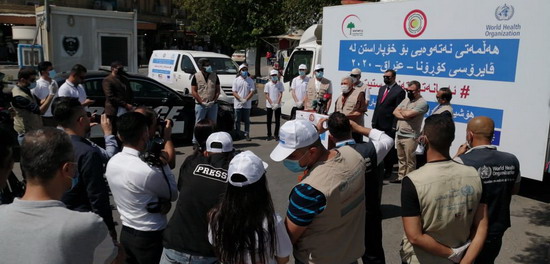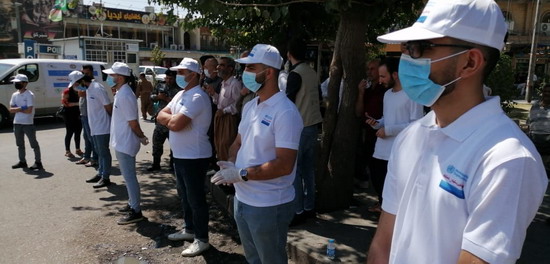 Launch of the campaign, opened by the Governor of Suleimaniyah (central, black suit), and attended by members of the local media and health authoritiesErbil, Iraq, 23 August 2020 – The World Health Organization (WHO), in cooperation with the Ministry of Health in the Kurdistan region, today began a COVID-19 awareness-raising campaign in the Kurdistan region to remind the public of the importance of wearing face masks, practising physical distancing and maintaining good hand hygiene. The 9-day campaign began in Suleimaniya, which has seen large increases in infection rates since the start of the outbreak, mainly as a result of its proximity and long border with neighbouring Islamic Republic of Iran.
Launch of the campaign, opened by the Governor of Suleimaniyah (central, black suit), and attended by members of the local media and health authoritiesErbil, Iraq, 23 August 2020 – The World Health Organization (WHO), in cooperation with the Ministry of Health in the Kurdistan region, today began a COVID-19 awareness-raising campaign in the Kurdistan region to remind the public of the importance of wearing face masks, practising physical distancing and maintaining good hand hygiene. The 9-day campaign began in Suleimaniya, which has seen large increases in infection rates since the start of the outbreak, mainly as a result of its proximity and long border with neighbouring Islamic Republic of Iran.
The campaign will mobilize more than 250 local community volunteers to reach a population of over 800 000 people in 10 target areas, including camps for internally displaced people and refugees in the Arbat and Kalar districts. The region hosts approximately 700 000 internally displaced people and over 220 000 Syrian refugees.
The Kurdistan region, like the majority of Iraq and many other countries, has been heavily impacted by the COVID-19 pandemic, which has placed a huge burden on its health care system. "The outbreak has presented a huge challenge for the provision of resources and the capacity of health care systems to accommodate the increases in the number of cases in almost all countries around the world,” said Dr Adham R. Ismail Abdel Moneim, WHO Representative in Iraq. “WHO and health authorities at the federal level, as well as in the Kurdistan region, have been closely monitoring the proliferation of the outbreak in Iraq. As early as February this year, WHO stepped up response activities to support the federal and regional ministries of health with urgent medical supplies and equipment, in addition to implementing consecutive awareness-raising campaigns in many parts of the country to limit the spread of the disease and stop it from encroaching on slums and camps hosting the internally displaced and refugees,” he added.
The campaign will use local radio to disseminate health-promotion messages and deploy mobile clinics to display WHO educational videos and animations urging the public to adopt basic public health measures to limit transmission of COVID-19, such as wearing masks, practising phsyical distancing and maintaining good hand hygiene. Booths have been set up at entries to local markets, main public places and busy streets to distribute brochures, flyers and packages containing personal protective equipment, such as masks, in addition to campaign T-shirts, to pedestrians.
 Local volunteers are oriented before the start of the campaign
During preparations for the campaign, many people shared their experiences of COVID-19. “Many have lost a family member, a friend, a neighbour, a loved one. Others have survived the disease after weeks of experiencing symptoms such as fever, malaise, cough and difficulty in breathing. It was such an awful experience that I do not wish anyone else to go through it,” said Ahmed Sadruddin, who lost a younger brother after a month of him being hospitalized in Shahid Aso Hospital in Suleimaniya.
Local volunteers are oriented before the start of the campaign
During preparations for the campaign, many people shared their experiences of COVID-19. “Many have lost a family member, a friend, a neighbour, a loved one. Others have survived the disease after weeks of experiencing symptoms such as fever, malaise, cough and difficulty in breathing. It was such an awful experience that I do not wish anyone else to go through it,” said Ahmed Sadruddin, who lost a younger brother after a month of him being hospitalized in Shahid Aso Hospital in Suleimaniya.
For Lana Rashad, the situation was terrifying. She was in her fifth month of pregnancy when she tested positive for COVID-19. She got the virus from her sister who visited her one evening without knowing that she was infected. The sister didn’t look well but she thought it was simple fatigue caused by her daily routine and household chores. “Two days later, my sister and her husband were admitted to hospital when they developed breathing difficulties, while I developed a severe headache, non-stop cough, sore throat and began to surrender to the thought that I was going to die,” Lana added, describing how she felt more than a month ago.
In Mawlawi Street, downtown Suleimaniya, a family of 6 has just recovered after a 2-week hospitalization. “The hard time we’ve been through wouldn’t have happened if we had committed to the lockdown and practised physical distancing,” said Sabah Mousa, a resident of the city. “The disease is a fact, not fake like others believe; it is dangerous and tough,” he added.
"There are many painful stories and people need to be informed of simple preventative measures like wearing a mask and practising physical distancing in order that they can protect themselves and their loved ones," Dr Sami Abdul Rahman highlights. “WHO is promoting this message through awareness-raising campaigns such as this one and the population have begun to realize the seriousness of the infection.”
WHO expresses its gratitude to the Government of Kuwait and the European Commission Humanitarian Office (ECHO) for their generous contribution to support implementation of this campaign, and to its local implementing partner the United Iraqi Medical Society (UIMS) for their suppport to this campaign.
For more information, please contact:
Ajyal Sultani
WHO Communications Officer
+964 7740 892 878
Pauline Ajello
WHO Communications Officer
+964 7729 877 288
Baraa Shabaa
WHO Communications Officer
+964 7800 010 244


